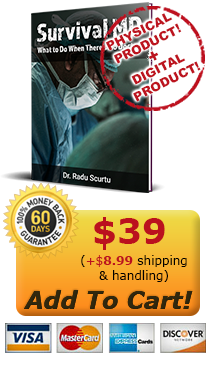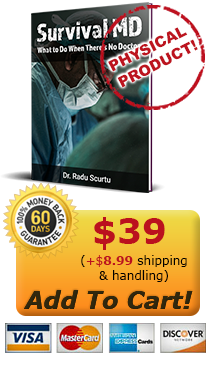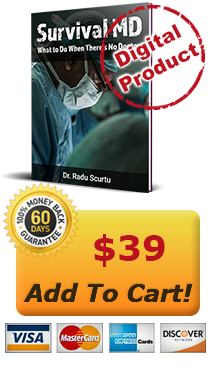“The hospital used to be
where you went to get well”
No physicians, no nurses, no hospitals, no ICU beds, no
ventilators,
no essential drugs, and little hope for
millions of sick Americans.
Here's how to prepare for
the perfect medical storm
On this page:
- Healthcare Paralysis: why US hospitals are about to be crippled by the exploding pandemic
- No doctors: Why it will be virtually impossible to find a doctor or a hospital bed in the US
- Medical Crisis Survival: 3 steps to take right now to protect your life in the medical crisis of the century
Fellow patriot,
You've heard it all:
"It's just the flu"
"Only 1% will die"
"Don't worry about it, only old people with underlying condition die"
Doesn't it drive you nuts?
My name is George - and besides being a "prepared patriot" for more than a decade... I'm also one of those "old guys" with underlying conditions.
I mean... I'm not THAT old. But I'm no spring chicken. My health, maybe like yours, is far from perfect, but I manage. I used to do a lot of dumb things when I was young. We all did. But it doesn't mean we deserve to die. No one does.
I won't go gently into that good night!
Not if I have something to say about it.
And I won't stand anyone that says that I need to lay down and die. I think it's beyond stupid-it's downright criminal to minimize the deadly threat to our country's seniors. But the world is filled with these idiots these days.
There is one thing that the dumb dumbs did get right:
Yes, the coronavirus does have flu-like symptoms. Yes, older folks like me are at risk. And yes, it's estimated that 1% of those infected will die (although some experts argue the number is as high as 3.4%).
What are these "geniuses" forgetting to mention? Oh, just the fact that if you're over 60, your odds of dying are 3.6%. It gets much worse for those over 70-at 8% case fatality rate... and insane for people over 80 - a whopping 14.8% CFR!
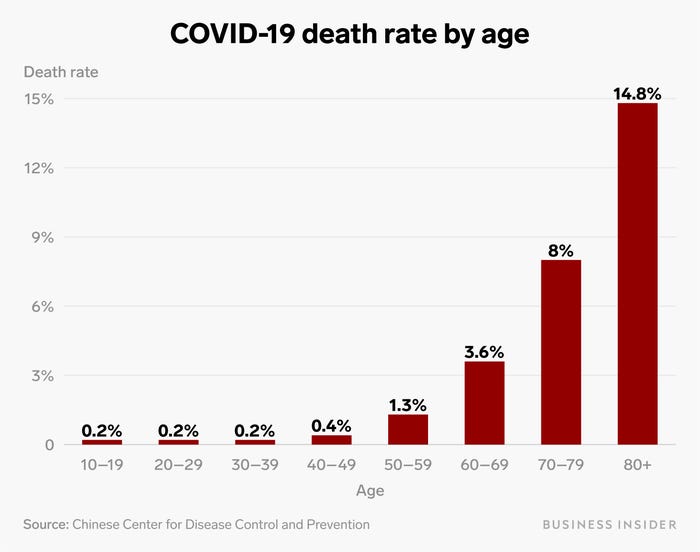
But there's something even worse about the coronavirus epidemic. Sure, 1 in 100 does feel like Russian Roulette, but these are still good odds. But what happens when people stop getting medical attention...
... because hospitals have collapsed under the crippling load?
How will you take care of your own health when there is no doctor around... and when hospitals are overflowing with pneumonia cases?
I know that I'm treating this as THE most important event in my whole life. My grandpa fought in WW1 and helped with the war effort for WW2. I believe this is our WW3 and we need to prepare for it like our very lives depend on it-even now in the 12thhour.
This is why I've created this page. On it I will explain:
- Why this is not a drill... and in fact we're in the middle of one of the most severe health crises since the Spanish Flu
- why the American healthcare system simply can't handle the load
- and why, because of this, it will be really hard to find a doctor or a nurse to take care of you, should you needed
But luckily there is a medical solution for people like us - a simple way to become more "medically self reliant", at least until hospitals can catch a breath.
If you're over 50, I urge you to stop whatever you're doing and read this now. Your very life, and the lives of your family members depend on it.
But first, you'll probably want to know...
... who I am and why you should listen to what I have to say:
Like I said, my name is George and I am from Survivopedia.com-one of the leading survival websites on the Internet. Odds are, you don't about us. Many people don't. In good times, people hate us for "being wrong" and for somehow "spreading fear". In bad times like these, we are hated for being right. You can't win with these guys.
I've heard it all-that I'm a conspiracy theorist, a tinfoil hat, a crazy prepper - you name it. To say that this name calling didn't hurt would be a lie. At times, I was questioning my mission. What am I doing here? For what? Who am I trying to help? Do people really want to hear our warnings, or am I wasting my time?
But over time, I learned to stop paying attention to the morons. And I realized that we were not alone. When we published Backyard Liberty and showed people how to prepare for a food crisis, more than 140.000 Americans heeded our calls. Even more were interested in our EMP preparedness course.
Our mission is to make every American household more self reliant. It's a tall order. But I our message is more important now than it ever was. That is-that you need to learn how to become medically self reliant-and do it fast!
Because...
By the end of the year, up to 228 million Americans
might
get infected with COVID-19
I know it sounds like a lot. It's not-in fact, it happened before, and not just once. In 2009, 59 million Americans got the H1N1 virus (aka the swine flu). Up to 45 million Americans get simple flu every year. And back in 1918, when the US population was a bit over 100 million people, close of 1 in 3 American men, women and children got the virus.
Why am I telling you all this? Because it's important to realize that saying that "the coronavirus is like the flu" is like saying that Hurricane Katrina was "just a storm". Understatement of the century. Because the coronavirus is twice as viral as the flu.
A single person infected with the novel coronavirus will, in turn, infect 2 to 3 other people on average. Some experts say it could be even more. By comparison, the number for flu is just 1.3. This means that it takes very little for the new virus to spread-it's been estimated that infections double every 4 to 6 days.
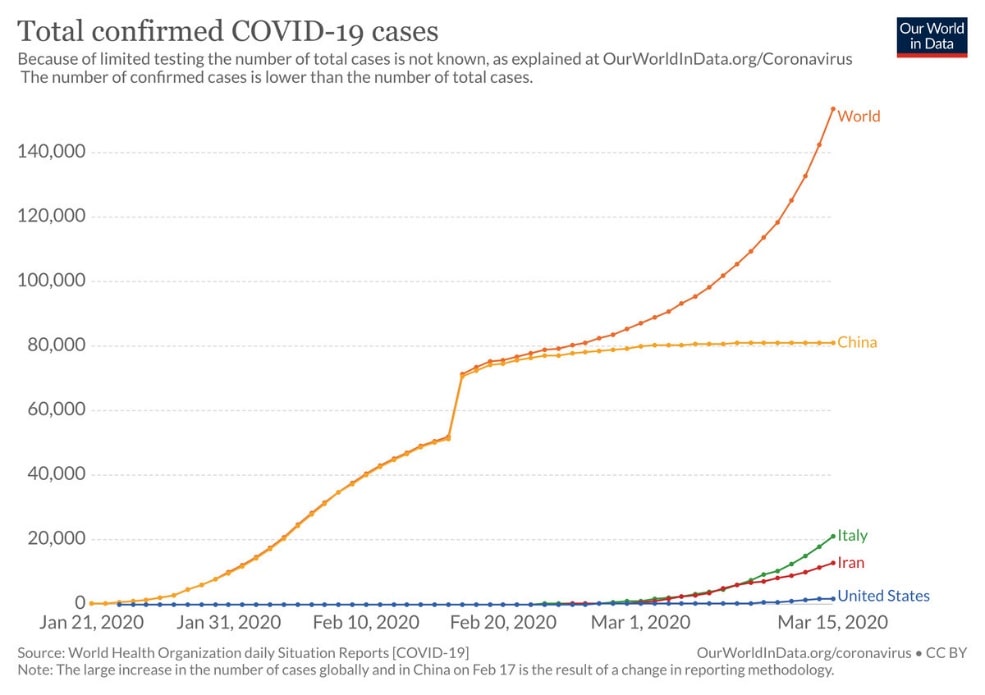
Even if you hated math in school (I did), this one is easy to understand. 100 cases will turn into 200 in just 6 days. 400 cases in 12 days. 800 in 18 days. How many in 60 days? A whopping 100.000.
It's so serious, that leading virologists are estimating 40 to 70% of the world population could get infected within a year. It's something Angela Merkel, chancellor of Germany, agreed with.
OK then, so many of us are going to get infected. So what? We still have 99% odds of survival, right?
Sorry to break it to you, but this is WRONG WRONG WRONG. And whoever is spewing this deserves to be hung for treason-and for putting our country's seniors in mortal danger.
They say the devil is in the details. This holds true for the novel coronavirus as well. Because before it kills... the coronavirus will put up to 20% of those infected in hospital.
And here's the kicker:
When this hits full force,
there won't be any hospital to
put us in!
If you take a closer look at the numbers, you'll see something frightening:
Of those infected, about 13.8% report severe illness-like shortness of breath, or they require supplemental oxygen. Another 4.7% are critical-which means they're forced to battle respiratory failure, multi-organ failure or septic shock.
All this might sound scary-but usually, it would be something the healthcare system would be able to handle well. The load is usually manageable, unless there's a really bad flu season. But with the novel coronavirus, an already bad flu season is turning into...
... The Mother of All Pandemics!
Because there aren't enough hospital beds in the world for this.
The US healthcare system is already on the brink because of an unusually bad flu season. Why? You probably didn't know that, but the US has only 2 hospital beds per 1000 people. We're #31 in the world, far behind even communist China's 8 beds per thousand (4 times more!)
And those beds are already overflowing with patients who have anything BUT Covid-19.
Second of all, the US healthcare system has a serious personnel problem. Simply put, there aren't nearly enough healthcare workers. A recent study shows that we would need an extra 2.3 million new healthcare workers... just to be able to properly take care of the aging population in a "business as usual" scenario. Not even accounting for a pandemic.
Plus, the coronavirus epidemic is bringing about some serious (and unexpected) problems. For instance, it's estimated that close to 38% of nurses have a child at home. With schools closed across the US, this will likely keep valuable personnel away from where they will be needed most.
But wait... it gets worse. This novel virus tends to infect people who are in close proximity with the infected. Which tends to be doctors and medical personnel. Which means you'll need to...
Prepare for a scenario
where there won't be any doctors
available
In Italy, it took one infected to "disable" 16 healthcare workers for 2 weeks. They had to be quarantined. In South Korea the epidemic was so bad, that nurses quit their jobs in droves, for fear of getting infected themselves. Iran recently started calling dead medical staff "martyrs" ... hoping that the promise of heaven will stop doctors from quitting their jobs.
We're not Iran. It's likely that things aren't going to be that bad. But don't count on the healthcare system to be here to help you. At best, it's going to be under severe strain. At worst, it could be virtually shut down for a few months.
The bottom line is...
... this time, the health system is not going to be here for us!
Some people would argue that it was never here for any of us-with greedy corporate CEOs and Big Pharma trying to squeeze the living soul out of you and every last dime out of your wallet. But this time, you need a real plan to weather it out on your own.
Look, I'm not one to distrust doctors. I wouldn't be alive without them. Most of them are good people who truly care about patients. But I think it would be wise to prepare for a short to medium-term future where doctors, or hospitals, might not be available.
So what are some practical steps you can do right now?
Your best bet, until someone comes up with a vaccine or a winning antiviral, is to try to delay getting infected as much as possible. In this scenario, spring doesn't kill it. The warm weather won't kill it either. And the virus doesn't mutate into something harmless.
Now is the time for hospital-like hygiene. And I don't mean "wash your hands after you go to the toilet" kind of hygiene. I mean "doctor-about-to-go-into-surgery" level of hygiene, with a healthy amount of paranoia every time you touch something outside of your own home.
I won't repeat the advice you've probably gotten 100 times already. Wash your hands. Avoid crowds as much as possible. Assume everyone is infected - including family members. Buy your groceries online instead of going to "virus factory" supermarkets. Basically...
it's OK to over-react now, and laugh it off later when the threat is gone.
I will stress one little detail though that many people are missing. Pay attention to how often you touch your face. And stop doing it. I know, hard. This health official was licking her fingers to turn pages... just as she was explaining why it's important to never touch your face.
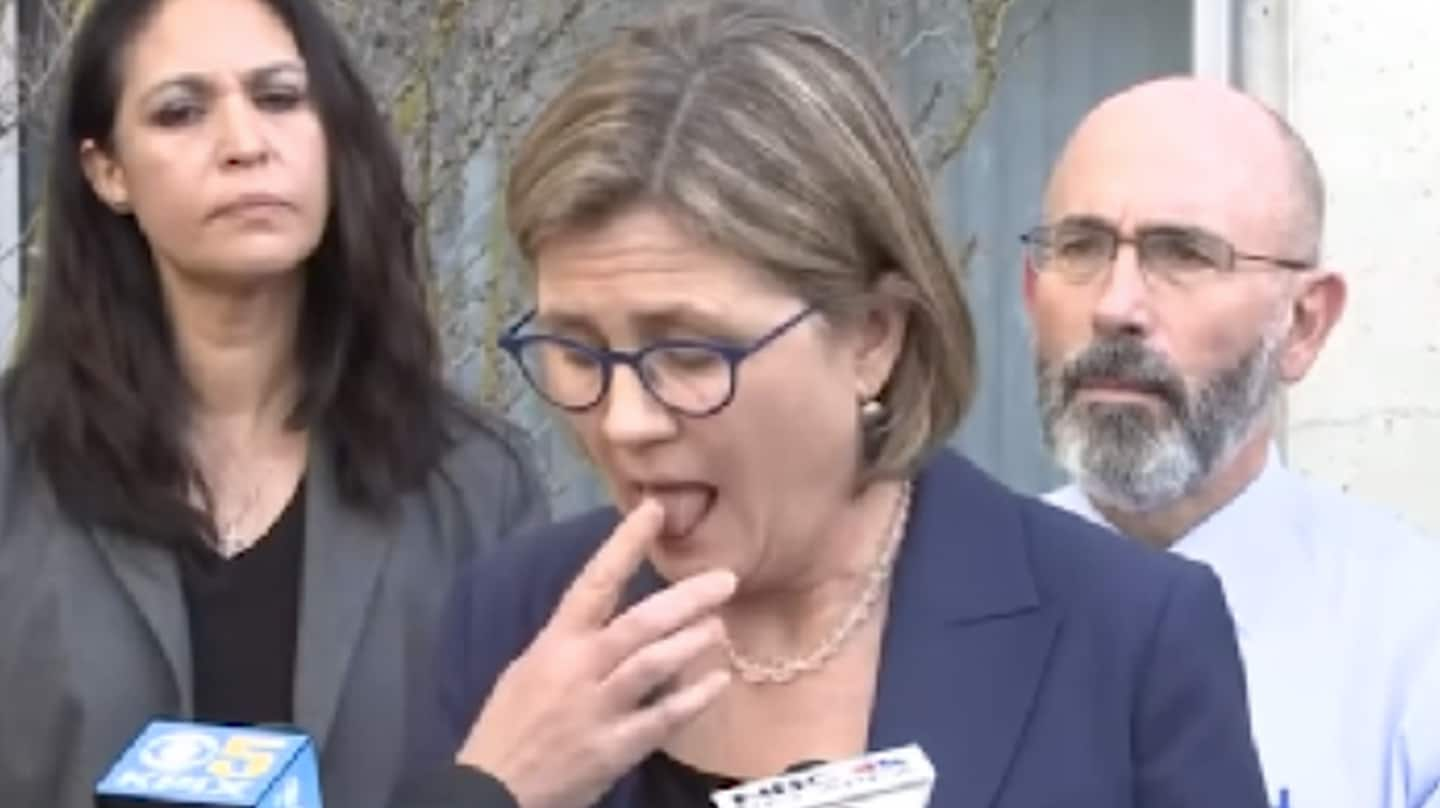
Maybe your face is getting itchy just reading this, and you want to do it. Don't.
I know how it is. I have a deviated septum in my nose, and because of it I have the bad habit of picking my nose (I know, it's gross). I've been trying to ditch this habit for decades. It seems like it's taking an existential threat to finally put a stop to it (I'm lying-I'm still picking my nose, but I make sure I do it after I wash my hands).
Do you have a beard? You probably play with your beard. I do. Wearing glasses? See how often you touch your face. Enough said.
I do have one tip for you that seems to work: tie a red ribbon around your index finger. It will make it a lot easier to notice-and hopefully stop - your bad habit.
Step #2: prepare for shortages of essential drugs
The next thing you want to ensure is that your medicine cabinet is fully stocked. And I don't mean for coronavirus, because there's very little you can do about it-other than trying to boost your immunity with vitamin C and D and hope for the best.
But for everything else, you will need to prepare for severe disruptions of the supply chain. This is crucial-and here's why. Very few people know, but we're constantly exposed to supply chain disruptions. For instance, did you know that 5 years ago, 85% of the world production of IV bags happened in Puerto Rico. It took just ONE category 5 hurricane to bring everything to a halt-and to cause a huge shortage of IV bags worldwide.
It's worse with the coronavirus. Because studies show that there are 153 critical drugs that people with chronic disease need right now-or else they with die. Many of them are made in China or in India. And we're already experiencing shortages of them without a pandemic. Now that the coronavirus is hitting full-force, you need to brace yourself for possible worldwide disruptions.
It's a case of "criminal globalism". You'd laugh if you heard the defense department outsourced all its ammo production to China-but this is what we're doing with our drugs.
So what medicine to stockpile? I have a special list from a top survival doctor, and I'll share it with you here on this page in a moment.
Step #3 is probably the most important. And that is...
... you have to build some basic medical skills that could save your life in a "no doctor" scenario
Knowledge is power, and this kind of knowledge gives you the power to save lives-yours, or a family member's.
You must be thinking.... you, learning medical skills? I know this probably sounds crazy. What am I saying here, that you'll perform your own surgery? That you'll treat some serious health problems, like a stroke or heart attack?
No. If any of that happens AND there is no doctor, I hope you scored good points with God-because you're going to need all of HIS good will. But...
just because you won't
perform your own brain surgery,
doesn't mean
there aren't things you can do
Quite a lot, actually!
How do I know this? Years ago, when the Ebola pandemic happened, I was afraid that it was going to be "the one". Luckily, that wasn't the case. But while I was reading every available source, and doing my research, talking to doctors, etc... it occurred to me. Not all doctors are alike in a "no healthcare" situation.
As I was doing my Ebola research, it struck me that the best doctor for a medical crisis will probably not be some "silk underwear", Porsche-driving doctor from a billion dollar hospital. My best bet was someone from the trenches. A doctor who is forced to perform miracles with no expensive, state of the art technology. And while facing severe drug shortages. In short, ...
... I needed a 3rd World Doctor
If I wanted to learn from the best... I knew that the best crisis doctor would be someone who fights crisis on a day to day basis. And after a few months of research, I found my guy-in one of the poorest countries of the European Union-Romania.
His name is Dr. Radu Scurtu-and he's a rather unusual surgeon. While he's working within the state-of-the-art French healthcare system... he earned his stripes in the terrible healthcare system that Romania had in the early 2000's.
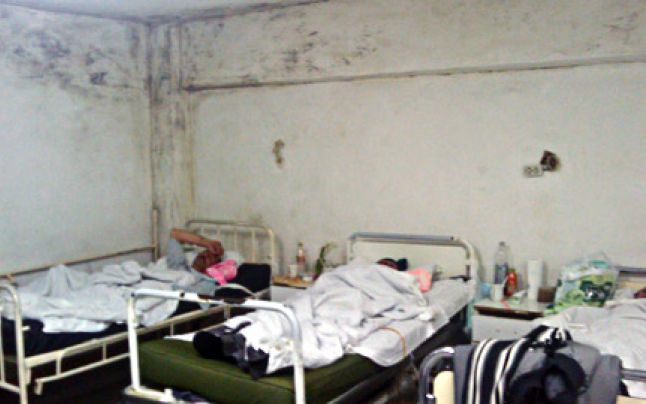
The doctor had seen it all. No electricity. No proper disinfectants. Having to seat 2 patients in the same hospital bed, because of shortages. Rats and cockroaches. Things that would make your stomach churn-and that you'd never see in the US under normal circumstances.
Dr. Scurtu managed to get out of that system-first, working for a few years in Germany, before moving to France. But he took with him a wealth of information on how to deal with a collapsed system. What's more, moving from "stone-age" to "state of the art" meant he could get the best of both worlds. Romania had taught him self reliance and ingenuity. Western Europe provided the expensive toys.
It reminded me of a lesson I learned from my grandpa-a self made multi-millionaire, but who had weathered two wars and the Great Depression. While Grandpa was happy to enjoy a life of luxury, he always liked to remind us that it can and it will all go away. He had lost it all multiple times-and had made it all back in multiples, with the help of God and of his own good attitude. Grandpa was fond of saying:
"There is no education like adversity"
When you think about it, it makes sense. Should the healthcare system collapse, most of our fancy pants doctors will be screwed. They have no idea what it's like to operate with a flashlight. Or what to do with a patient when basic medicine is out of stock, and the fancy equipment is hogged by thousands upon thousands of sick people.
They will be overwhelmed. And WE are going to be the ones who will suffer the most.
When I met Dr. Scurtu, one of my first questions was "what can I do to fend for myself in a medical crisis?". I was expecting the same run of the mill response I had gotten tens of times from other doctors-that you shouldn't try to play doctor, that I should go to the hospital, yada yada yada. I knew that, I'm not an idiot. But what if there IS no doctor, and no hospital?
Dr. Scurtu was more than happy to take my question. And he gave me an earful. Turns out, short of surgeries and complex medical procedures, there is quite a lot of stuff you can do! Here's some of it. But first, a disclaimer:
Don't try any of it without talking to your doctor first!
I'm giving this for information purposes only. If you have a doctor you can access, call him. If you can go to a clinic, do it. That's the safest course of action, and it would be irresponsible of me to suggest otherwise.
Below you'll discover what a doctor does when they can't go to a hospital. Use your own discretion.
Here's what I learned from Dr. Scurtu: that if you want a good chance of being to treat something properly, you first want to know you diagnosed it right. He taught me the simple TeCaMoLo principle. These are the core questions you need to ask, to clarify the circumstances in which the injury happened:
TeCaMoLo:
TEmporal-when did the injury occur?
CAuse-why did it happen?
MOdal-how did it occur?
LOcation-where did it happen?
Ask these 4 questions and you'll have a proper baseline for healing the patient.
Beyond that, the Dr. showed me ...
... how to recognize the signs of medical distress
Is the patient pale? Does he or she have a too weak or too rapid pulse? Are they confused? Are there any obvious signs of injury?
The doctor then showed me how to perform a body check (more about this later). And hundreds of little tidbits that could save your life. For instance, do you know why it's a good idea to have an old-school glass syringe in your house? It's because you can sterilize and safely reuse glass... unlike the disposable syringes. In fact, it's probably a good idea to buy some medical pliers and pincers, to have just in case.
I asked Dr. Scurtu what medicine to stockpile - in the event that you won't be able to find them in a crisis. This is particularly important now-with global supply chains falling like dominos. He gave me more than a handful.
Let's start with the obvious.
What should you have on hand, in case of pneumonia?
Try to have some Cipro around the house. For kids, Bactrim or Suprax suspension will help, or Avelox.
For asthma and breathing problems, see if you can get your hands on prednisone taper, Albuterol, or Primatene Mist.
For shortness of breath or chest pain, stock up on nitroglycerin 0.4 mg tablets, as well as anticoagulants.
For non-infectious Diarrhea, Imodium-AD will help. In case of a urinary tract infection, make sure you have Bactrim or Macrobid.
Other things you MUST have in your stockpile include: aspirin as a blood thinner; atherosclerosis medication, like Mevacor or Zocor; Coumadin as a blood thinner for stroke; Aleve for arthritis; Zantac for heart burn; Lisinopril or Tenormin for high blood pressure.
And in general, you should make sure you can get your hands on...
- Fiber laxative
- Aspirin as a blood thinner
- Atherosclerosis medication. Mevacor (lovastatin); Zocor (simvastatin)
- Blood thinners for stroke Coumadin (warfarin)
- Medications for arthritis Aleve (naproxen)
- Heart burn medications. Zantac (ranitidine).
- High blood pressure medication. (Lisinopril); Tenormin (atenolol).
He told me exactly what medicine to stockpile for: cold and flu, allergies or pain. For breathing problems, gastrointestinal issues, or skin conditions. What antibiotics to get, what birth control to take; and if you have kids or grandkids, 6 drugs you absolutely need to have in your cabinet. Too many things to mention here-but I'll show you how you can get all of the exact same information.
And as I was talking to the doctor, I realized I had stumbled on a treasure trove. I felt like a kid in a candy store. Or better: like a starving survivor in a zombie apocalypse, who just discovered a hidden stockpile.
So I knew I had to persuade Dr. Scurtu
to share his wisdom
with our community
Extracting practical wisdom from survival experts was, after all, our specialty.
But the good Dr. wasn't interested. He liked his privacy. He didn't like fame of any kind. And for sure he didn't want any of the negative attention that tends to come with being any kind of survival expert.
It wasn't about the money. The French healthcare system pays doctors handsomely. But I was determined to win this one-because I knew this wasn't about our egos. There was much more at stake-the lives of thousands of Americans who would be left helpless in a medical crisis.
After a lot of cajoling and maybe a little bit of emotional blackmail, I succeeded. And boy oh boy did we deliver.
We interviewed the doctor for two weeks straight. What's more...
... I was too paranoid to let the good doctor write it all by himself
Truth is, as much as I loved his expertise, I was afraid we will end up with a course written for other doctors. Too often, experts suffer from the "curse of knowledge". They know the stuff so well, that they forget what it was like to not know. So they tend to give really complicated explanations that no one really understands.
But that was fine. I knew NOTHING about how to be your own doctor in a crisis. So I asked all the dumb questions (so you won't have to). When I didn't understand something, I asked the doc to rephrase it in plain English. And when we put it all together, it turned out to be the most practical course on medical preparedness you'll ever find. We called it Survival MD-What to Do When There's No Doctor
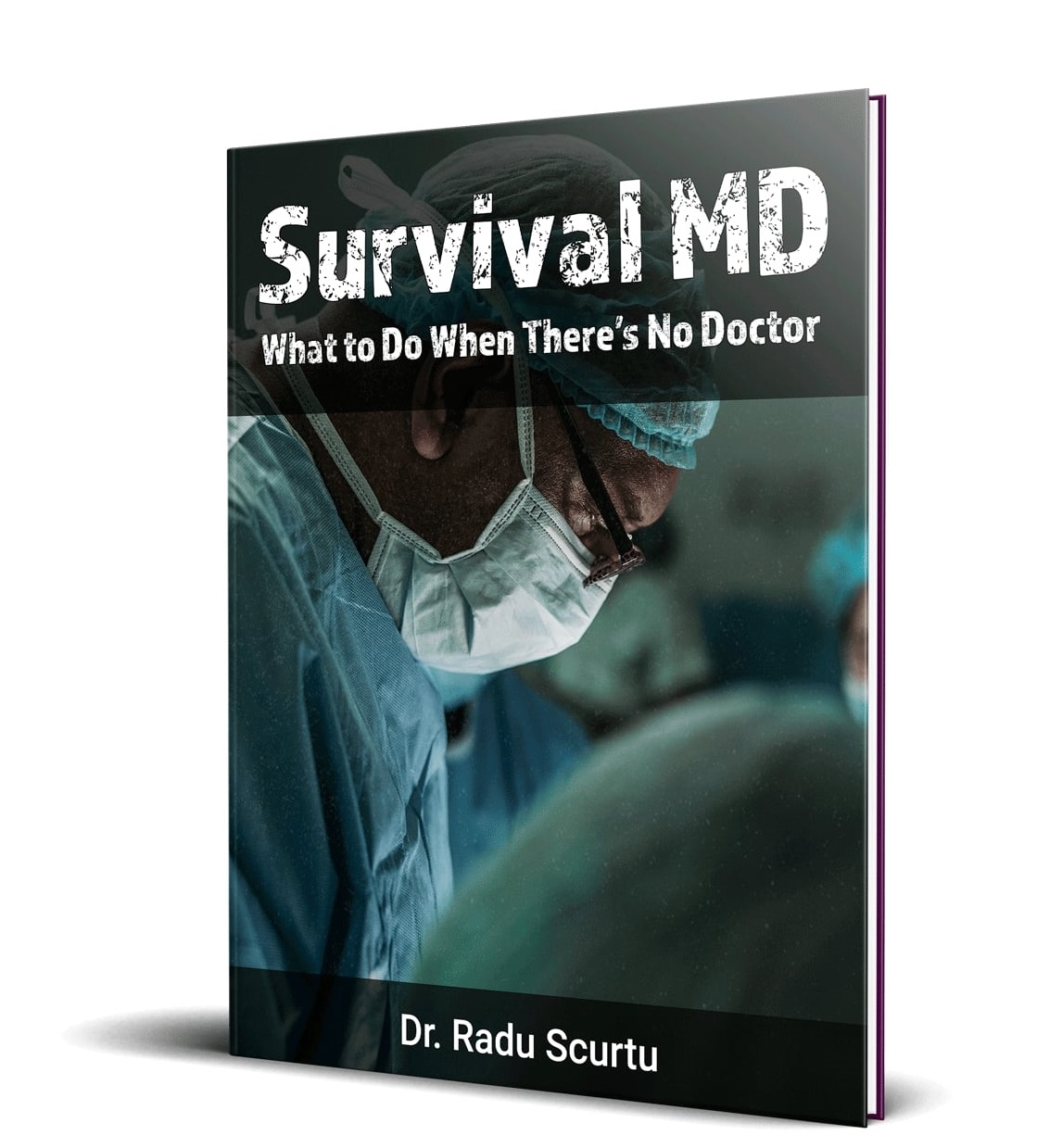
"This book is a must-read for disaster preparedness. It is clearly written, easy to understand, and extremely informative. I highly recommend Survival MD!" - Zabian Crosby
"I think that everyone in the U.S. should have this manual. Could save your life!" - Mike Kirsch
Before I go on and explain what's inside, I want to set the record straight.
Here's what Survival MD is NOT:
First of all - This is NOT a medical tome. If you're planning on becoming a doctor or a registered nurse, this is NOT for you. This is a practical, down to Earth, plain-English course on how a layman can "replace the doctor"-when there is no doctor available and you're in a life and death situation.
Second of all - It's NOT a book on how to treat yourself when you can easily go to your doctor. That would be plain stupid-and it would be irresponsible for me to suggest otherwise. If you're looking for a way to stop going to the doctor when there's nothing wrong with the healthcare system... it's my duty to tell you that you might put your life in great danger.
Third (and frankly I don't care if this hurts our sales)-this is one book I hope you will never need. Just like I hope you never have to shoot your gun in self defense-but it's wise to protect yourself.
"Si vis pacem, para bellum"
This is a Latin quote I hold dearly. It means that "If you want peace, prepare for war". It's why we keep a big army even though we're not fighting the Nazis anymore. It's why you keep a fire extinguisher in the house. This course is a fire extinguisher. It will not prevent fires-but it might help you put them out.
Now that I got all this out of the way, let me tell you why I'm so excited about Survival MD. There's no other "medical survival" course like it on the planet. And I'm not using these words lightly.
As far as I know, this is the only course of its kind. Something that will allow you to weather out a medical emergency where there is no doctor. It doesn't matter if it's a pandemic, a grid-down scenario, or a Katrina-like event that clogged hospitals for weeks.
Rave Reviews for Survival MD:
"I've found your book to be very informative and especially appreciate the lists of supplies suggested." - Tammie Barletta
"SurvivalMD is easy to understand and uses items you should have available. Also contains good ideas on what you need to stock up on." - Sarah
Very detailed but easy to understand. The way it is shown and explained it makes my comfort level very high in performing what is necessary to address various situations." "- Rusty Coleman
An 80/20 approach to survival medicine
Maybe you're familiar with the 80/20 principle. If not, here's a refresher: 80% of all our problems come from just 20% of causes. You learn 80% of any topic in about 20% of the time you study. You spend 80% of your time with less than 20% of your friends. Once you understand this universal principle, you'll start seeing it everywhere.
It's the same in medicine. Sure, you can go to medical school, pay a quarter million dollars, and sink 4 years or more into this. Or you can take a shortcut: learn the 20% of medical knowledge that will help you in 80% of the situations. And this is exactly what Survival MD is about: a "layman's shortcut" to developing life saving skills for a crisis.
Survival MD has one purpose, and one purpose only: to keep you and your loved ones alive until a qualified specialist can see you. And in order to do this, we pulled out all the stops.
Here's a glimpse of what you'll find inside:
- Got asthma or COPD? Dr. Scurtu will show you how people with respiratory disease need to prepare (one of the things you absolutely need around the house is an oxymeter. And 4 other things you need to order online right away)
- Planning for long term medical survival? Take care of this first-even if there's nothing wrong with your health (NASA does it to all their astronauts)
- 4 items to stockpile (not medicine!) for someone who is wheelchair bound. Plus: what you should do if your MS is exacerbated and there's no doctor.
- What if you have cardiovascular disease, or peripheral vascular disease? And the dangerous warning signal that comes from your toes.
- The two fruits people with kidney failure must absolutely avoid... at least until a dialysis machine is available. Page 29
- ... and 7 other things you can do to prevent getting a deadly infection, when there's no dentist;
- What to do when there are no antibiotics available. Yes, veterinary antibiotics can help-but how do you know the right dosage? Page 44
- Why Augmentin may be the best antibiotic to stockpile (if you can still find it). And 6 other antibiotics that may save your life from a deadly infection (#2 is the best for pneumonia)
- Does your medical go-bag have a fully stocked "hygiene kit"? 19 things you should hoard. Page 55.
- How to make your own toilet paper using, if you run out. (this recipe uses baby oil or lotion-and will give you a good alternative when panic buying emptied all store shelves)
- This includes cheap alternatives if stores and pharmacies run out of the essentials. Plus: 8 medical instruments you didn't know you needed (but surgeons keep them in their homes for an emergency). Also included: 9 things to stockpile in your bug out vehicle
- Simple and effective first aid techniques you need to learn now (including how to treat a bullet wound). This might come in handy if there's an economic collapse and mass social breakdown. Page 81.
- What to do if garbage disposal services stop working. Full list of supplies you need for emergency sanitation. And how to deal with human waste so that it doesn't become a hazard. Page 84.
- Did you know you can make your own hand sanitizer that doesn't dry your hands, AND costs a lot less than the price-gouged versions you can find in stores? It's easy: all you need is some aloe vera gel and 99% isopropyl alcohol. You can still buy both online, in bulk. Take 1 part aloe vera gel and mix it thoroughly with 2 parts alcohol and you're set-for a fraction of what you'd have paid even before the pandemic!
- 4 essential medical skills for the lay person. You'll learn how to treat mild to moderate burns; how to straighten and splint fractures; how to stop moderate bleeding; and how to take care of complex lacerations.
- The right (and simple) way to give CPR. It's an easy but effective system called CAB, that stands for Circulation, Airway and Breathing. You'll also learn basic life support-like rescue breathing, chest compressions and basic first aid (you won't be able to give advanced life support... but basic life support might save a life)
- How to know within minutes whether your patient is in severe condition or it's only something mild using the Glasgow coma score
Rub clove oil on a sore tooth for relief...
How to build the ultimate medical go-bag...
Quick recipe for home-made hand sanitizer:
What people are saying about SurvivalMD:
"My dream was to be a Dr. I have read many books. This one is, by far , the best, and has the most information I have ever read. I feel, when used with common sense, it can be a wonderful resource to have until trained help arrives." - LARK LEWIS
"There is always something unexpected, which you haven't planned. Twenty four years in the service, nine years of it in Special Ops proved it to me. 5 stars for Survival MD" - Kenneth Rothwell
"The book will become a necessity to have close at hand in just about any circumstance thank you" - Kathy Smith
"Well put together and I need a lot of things to complete my prepping and I have only read one third the book!!!" - Karen Moeller
We've also included lots of information that we hope you never need-but that might become handy in a crisis situation. Things like how to use a defibrilator-and read an ECG. How to perform an emergency amputation. How to stop a bleeding in seconds. 5 ways to suture skin so it will heal faster. And so much more.
Even if there's a complete shutdown of conventional healthcare... there's still hope. Because there are plenty of herbal remedies that will keep you healthier until there's a doctor. For fever, you'll get a doctor's recipe for a mixture of yarrow, peppermint and elderberry flowers. For pain, you'll get 7 powerful reliefs. And lots of proven remedies for cold and sniffing, sore throat, diarrhea and constipation, and lots and lots of other health problems.
- You'll discover the top 5 most likely causes of death you'll be faced with in the aftermath of a crisis. It may sound weird... But focusing on these, means you'll ward off up to 80% of the illnesses! So there's no need to fill your brain with medical problems that have a 1 in a million chance of happening.
- And that's not all...Inside "Survival MD." you'll find the worst medical mistakes you can do in a crisis. Like...
- Do you know what you should never do if you're stabbed? People in third world countries struggle with this horrifying scenarios every day because of the high crime rate. There are two key procedures to avoid bleeding to death or even getting an infection.
- And do you know why you should never use a plastic bag or wet bandage to cover up a wound? In fact, doing it increases your risk of infection and even death!
- You'll learn how to put a dislocated shoulder back in its place just like professionals do. And it's easier than you think!
- You'll also find out how and where to get a few months' worth of prescription drugs. A little known secret for getting behind the counter drugs without a prescription.
- And life-saving advice for dealing with a whole range of conditions-like heart burn and gastritis; Crohn's disease; ulcerative colitis, IBS, kidney stones... an more.
And that's just a taste of what's inside!
We worked hard to bring you the ultimate medical crisis survival manual. And folks loved it. Just look at what people are saying about Survival MD:
"Just the information I have been looking for. How to stay healthy without Doctors or Hospitals. Thank You" - Joe Paulauskas
"This is a thoroughly readable reference. It's not med schools thorough text, but it is clear and is a good guide to save lives." - Jim Loyd
"very good book of medical knowledge. [Offers] options my Doctor does not talk about" - Walter
"Lots of good info in there. Not something you can find at Barnes N Nobles". Tonya Sei
"It's a wonderful book. Everything is clearly written. Five star is not enough." - Tonie King
" ...every subject explained in detail" - William Walker
"I found it to be simple, straightforward, and well illustrated, easy to understand and well organized. Best such "guide book" I have found yet." - Terry Ross
"I am not a doctor. But I do try to manage my own health, in view of how big pharma controls a lot of what doctors do and prescribe. I need to learn what I can, and now try to do without doctors as much as I can. So survival md is huge help in my view. thank you" - Ronald Carrier
"I thought the manual is easy to reference information needed especially in a crises. Very broad coverage of many situational occurrences. I'm glad I made the purchase. I have lifesaving & C P R training." - Phil
"Survival M.D., is GREAT. 5 Stars all the way. Thank you so much. It is organized so that the average JOE BLOW can be ready to take care of self and family if needed. The book is well organized and written in simply everyday language without loosing the importance of medical education. thank You again. By the way, I'm a retired R.N. and eye specialty tech." - Lottie Lee hall
"This will be my main reference and Goes in with my survival gear. It guides a person on how to handle many medical emergencies. I am retired nurse and taught first aide to scouts over the years but being less involved, I have forgotten some skills. I'm traveling now but will be sure to have my "crash cart" up to date when I return home." - Johanne Cooper
"Practical and informative. Covers a lot of topics. Begin to realize what a SHTF event would do to our lives. Enjoy reading. Pretty fast read with a lot of detail."- Jim Costigan
But wait... there's more:
It's essential that you get access to Survival MD right away. We don't know what the future may hold for us. But you need to prepare-and you need to do it now.
This is why, when you're getting Survival MD today, I want to send you two special reports to help you through these hard times.
The first one is called...
Bonus #1: "The doctor's best practices for preventing a coronavirus infection"
Look - even if there's no cure or vaccine for COVID-19 yet, it doesn't mean there isn't a lot you can do to protect yourself from it.
We wanted to dispel some of the misinformation surrounding face masks (should you wear one like people in Taiwan and South Korea, or should you trust the CDC when they tell you they're useless?)
Or why washing your hands is not enough (there's one thing most people do that renders even the most disciplined hand washing useless).
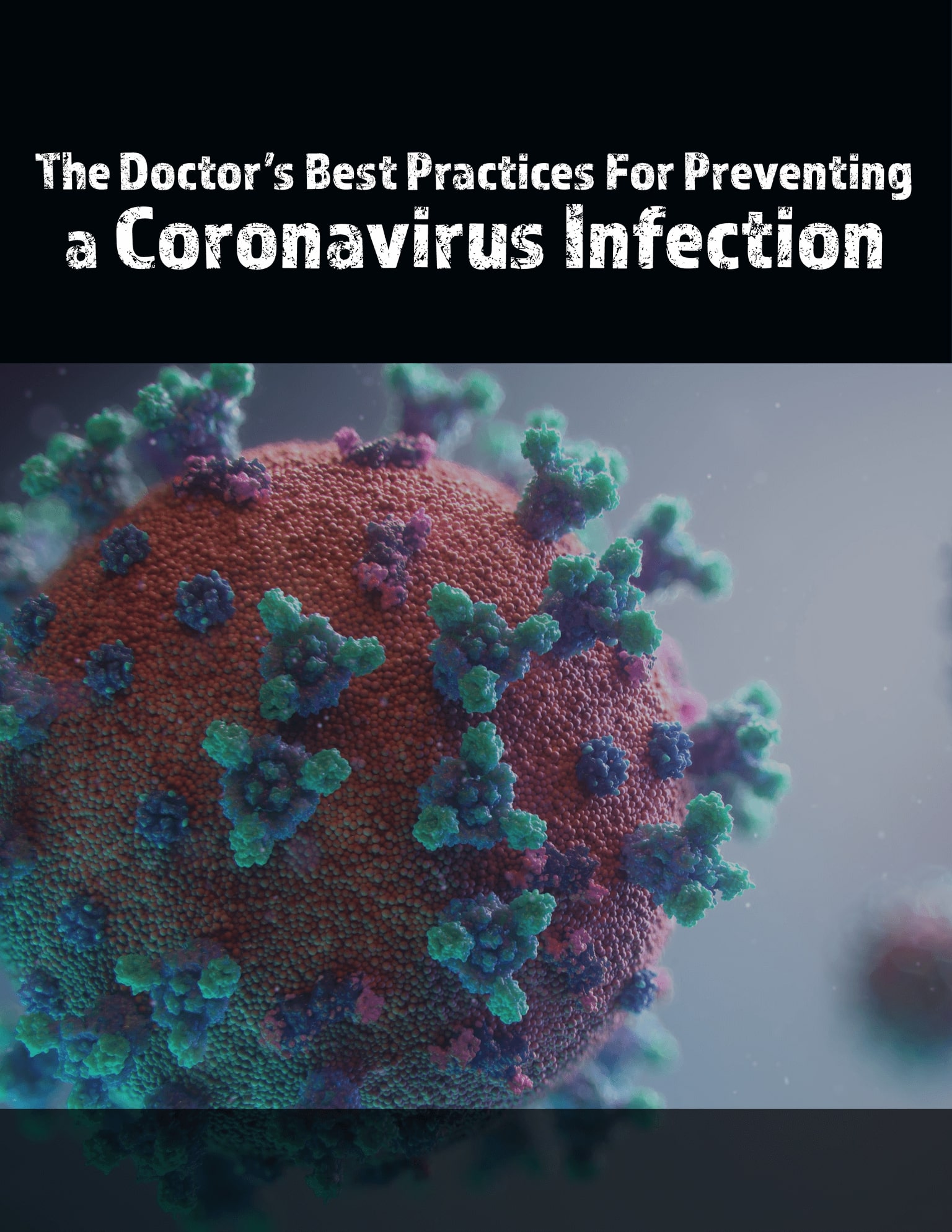
We show you how to practice food safety - so that you don't get infected when you shop for food, or when you cook it. And how to travel if you absolutely must.
We also included two essential things doctors do to boost their immunity for the flu season. (#2 slashed people's risk of getting the flu by 5 times. While the coronavirus is NOT the flu, it's been theorized that it will lower your odds of getting an infection).
The second bonus I'd like to send you is something I hope will never happen to you-but if it does, you will need this. It's called...
Bonus #2: "How to survive isolation and quarantine".
I did this research for myself-and I believe it will help all of us. Soon enough, you might find yourself in quarantine or some form of social isolation-either mandatory, or self-imposed. So how do you survive 30 days or more of isolation?
Quarantining alone is a different deal than quarantining with
others. At the same time, if one family member is sick but the
others aren't, it's going to be really tricky to isolate just the
sick person.
All these things bring up some interesting
issues - like...
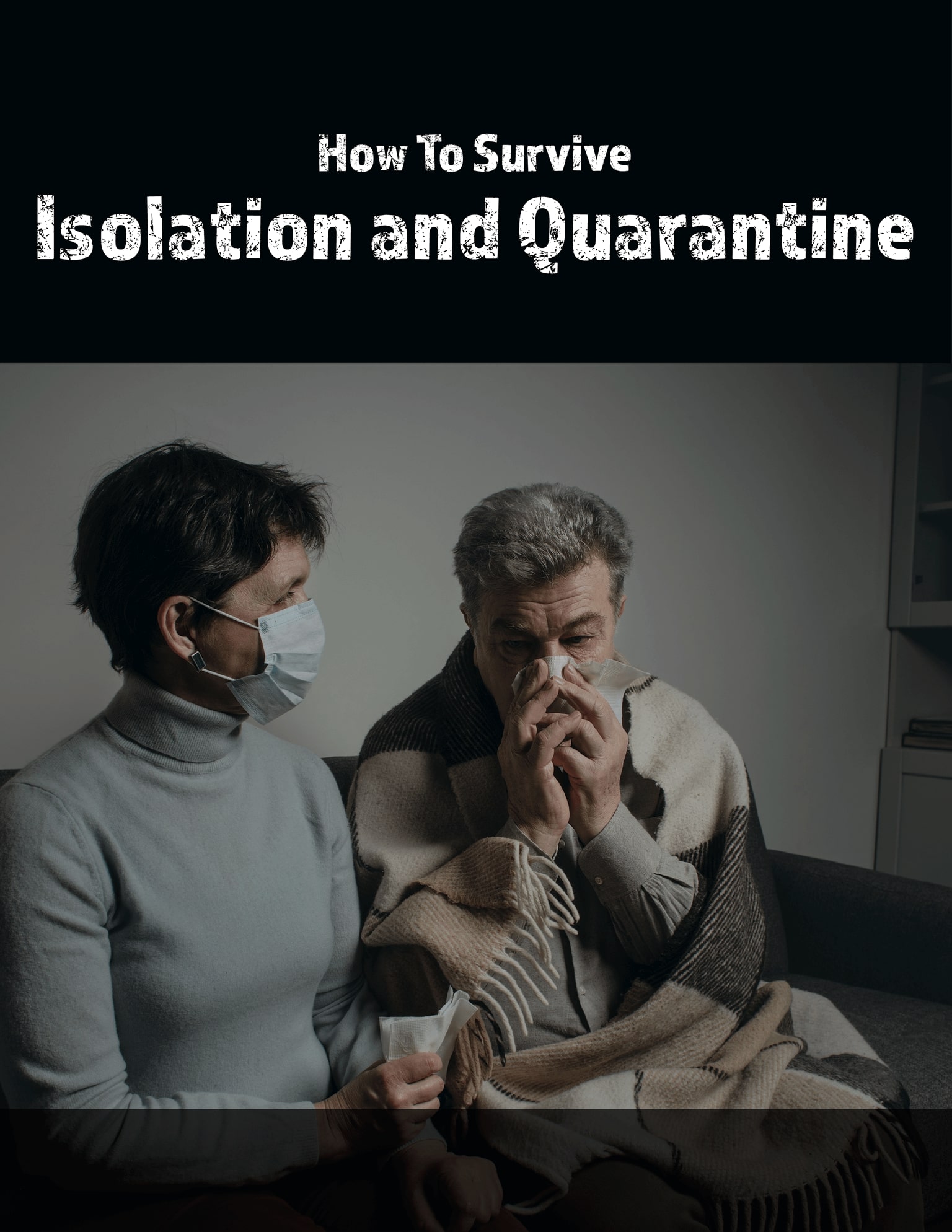
- How do you resupply while in quarantine?
- How do you avoid infecting others?
- How do you take out the garbage and make sure it doesn't pile up?
- And many simple things like that that most people probably never thought about.
You'll get this special report on isolation and quarantine for free, when you get the Survival MD manual today.
OK, how much will this cost?
Look, I won't hide it. This training is one of a kind, from one of the only "survival doctors" in the world. You're not going to find something like this anywhere else.
I can't stress how much I want for things to change - for this information to be something you will never need. But if you've read this much, you probably want to prepare for the unthinkable.
The only thing that comes close to this are medical textbooks. They will give you a world-class training - that is, if you can understand all the scientific jargon and are ready to spend up to $1400 for a year's manuals. Or you can get SurvivalMD, the crash-course... the "express" version for laypeople - and pay a fraction of that. You won't become a doctor. But you will be better prepared for a situation where there's no doctor.
You can think of this as a form of life insurance. For me, the best life insurance you can get is self reliance.
And I wanted to make it as easy as possible for you to become more self reliant in this crisis.
This is why this is not going to cost a fortune.
Plus, I want you to start reading this NOW, not a week from now. This is why you can...
Get it in print...
AND start reading immediately!
Look: This is not some quickly slapped together "e-book" or some other junk like the stuff ruthless marketers are peddling on the internet.
I think that when it hits the fan, it's important to have a hard copy in your hands. Something you can use as a reference manual every time you need to.
Plus, in a "power out" situation, a hard copy might be the only way to use this knowledge.
But at the same time, I don't want to rely on the USPS these days. They can take a week to ship the book to you, and I believe you deserve this information NOW.
So here's the deal: for people who are in a hurry and want the information NOW, we typically sell a $39 "digital only" version of Survival MD. For those who want it in print (and can wait up to a week for delivery), we add an extra $8.99 for shipping and handling. But today, I want you to get both the physical AND the digital and you only pay for the printed version.
This way you can start reading immediately... and still have a hard copy for reference in your library.
And frankly, the price doesn't even matter. That's because you're covered by...
Our 60 - day ironclad money back guaranteed
Here's how it works: the next 60 days are going to be essential-as epidemics can and will grow exponentially if they're not contained.
You'll get Survival MD and all the bonuses right away-so you can study it and use its wisdom immediately, without wasting precious time.

I hope it will ease your anxiety and help you feel like you're gaining control over your health and your life. Preparing for a medical emergency is one of the most important things you did in your entire life-and I want you to feel there's no risk.
I believe so much in Survival MD, that if you think it's not worth 10 times what you paid, you owe us nothing. Just send it back and we'll reverse the transaction instantly so you'll get every penny back.
On top of that, (and maybe I shouldn't say this), since this is a digital download, you can keep all of it just for giving it a try. Even if you decide it was not for you, and you want your money back. Scout's honor.
Now it's time to make a decision
that will influence the
rest of your life
On this page, I've shown you how this rapidly unfolding horror is not "just the flu": it infects twice more people, and it's 10 to 20 times more deadly. Worse yet, of those infected, 1 in 5 needs a hospital-which will put a terrible strain on our healthcare system.
You've seen that not only we have 4 times fewer hospital beds than China... but these beds are already filled with patients. On top of this, we are missing a huge number of healthcare personnel-and as they get sick themselves, we're bound to have even fewer.
When this thing hits us full force, there won't be a hospital to go to if you're sick. This is why I've explained that the only strategy that makes sense is social distancing-and becoming "medically self reliant".
And hopefully I've made a good enough case for why you need to learn some basic-but essential-medical skills, to save you in a potentially life threatening situation when there's no doctor around.
I don't think there's a better teacher
for all of this than
Dr. Radu Scurtu
He's proven his resilience in the "trenches" of one of the least funded European healthcare systems... and he's had his fair share of modern healthcare. He's the only "survival doctor" that I would trust my life with.
Now it's up to you. And frankly, time may wait for others, but it may not wait for this pandemic. The way it grows exponentially, soon enough there might not be a hospital bed for any of us. I truly hope this is not the case. This time I'm really looking forward at being laughed at for "overpreparing" or for being a "chicken little". Smarter people than me, like Dr. Anthony Fauci, are recommending that we overprepare rather than be blindsided.
But this one I believe is real. This is why getting Survival MD might just be the best investment you make this year. Remember - we'll also send you the two special reports, "The doctor's best practices for preventing a coronavirus infection" and "How to survive isolation and quarantine" free of charge.
So I urge you to click the "add to cart" button now and thank yourself later-after all this is over-for making one of the best decisions in your lifetime. Remember, you risk nothing-you're backed by our 60 day no questions asked guarantee.
